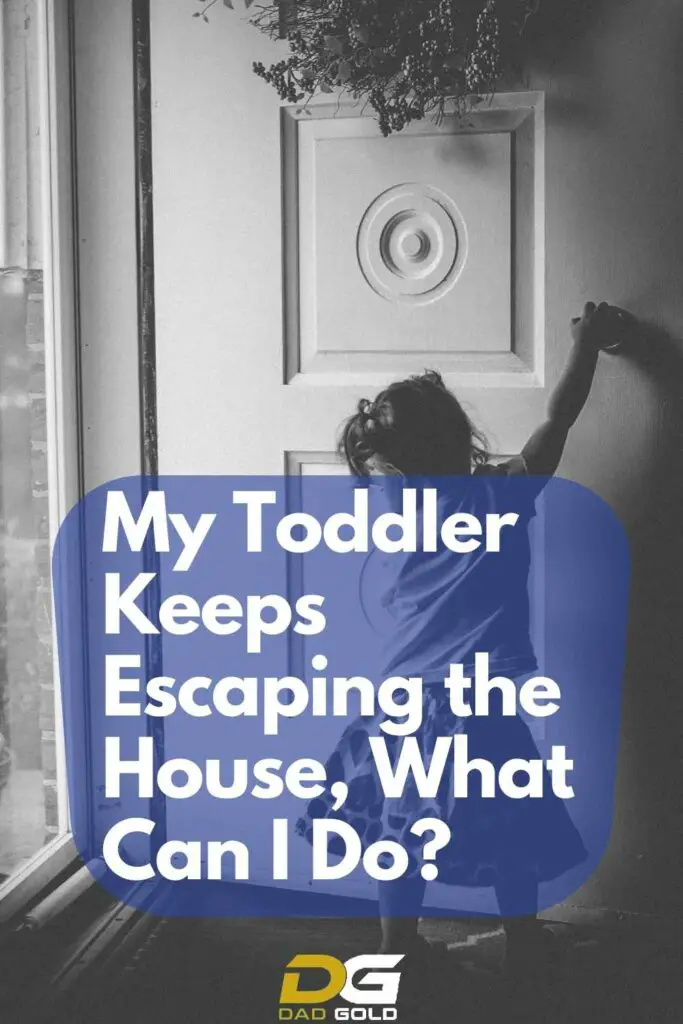Throughout your child’s early years, it’s completely normal to experience them wandering out of the house by themselves.
It’s nothing to be too worried about.
Typically, it’s normal behavior that aids their development.
However, it would be best to have some control over this to ensure they’re always safe. For example, wandering toddlers isn’t good if you live on the main road.
After all, being a good mom or dad to a toddler means keeping them safe, right?
To put in an action plan to keep your toddler safe, you first need to understand why they’re hell-bent on escaping your home.

Possible Reasons Why Your Toddler is Escaping the House
- Goals – Studies have shown that some toddlers try to escape their homes because they have a goal. They may feel they have unfinished business in the place they just came from.
- Fear – If something in the home scared them, their natural reaction would be to run away. It may be that your pet has startled them or a loud noise they aren’t familiar with.
- Disorientation – Your child may wake up in the middle of the night and wander around if they don’t know where they are.
- Excitement – To your toddler, the world outside is full of new and exciting experiences, and they want to get out and enjoy them.
- Becoming Overwhelmed – Children with specific care needs, such as children with autism, are more likely to become overwhelmed in a situation with many people. For example, your child may leave the house at family gatherings to escape the noise or excitement.
- Distraction – Something outside may have been distracting for your child, making them want to run out to see what it is. It may be flashing lights, the mailman, or other children outside.
How Can I Stop My Toddler from Escaping the House?
If your toddler is a flight risk, no matter the reason, you should find a way to limit this behavior to protect them from dangers outside the home, such as cars, ponds or rivers, other people, or animals.
The last thing you want is for your toddler to sneak out the back door and onto a busy road.
-

Bold Male Pride – Baseball Trucker Cap Celebrating Masculinity
£18.00 Select options This product has multiple variants. The options may be chosen on the product page -

Dad Bod Appreciation Gift Mug
£14.00 Add to cart -

Dad Bod, Bad Jokes Structured Baseball Cap
£22.00 Select options This product has multiple variants. The options may be chosen on the product page
Before you push your toddler in and install an alarm or lock on their bedroom door, they are other, less restrictive options to consider.
Here they are:
1. Child Locks

Ensuring that your house is secure should always be a priority. One of the simplest ways to stop your toddler from escaping the house is by using child locks on all the doors and windows (if they are low enough).
These locks make it difficult for tiny hands to get out of their reach. For instance, you could install a chain lock on your front door or main entrance.
If you’ve taken it down, you might consider bringing back the baby gate. Even if your toddler can open it, it will slow the little escape artist down.
If your child physically can’t get out of the house, then the problem is solved!
If you have additional door locks, ensure an adult and other family members can easily open them, as they could be an additional fire hazard.
You might also want to consider using door knob covers to make it a little more difficult for a child to get enough grip to open them.
2. Door Alarms

If you’re not keen on locking your doors to keep your child in from a fire safety perspective, you may want to put in provisions to make you aware of when they try to leave home.
There are door alarms or chimes you can easily hook up to your external doors that will ring each time the door is opened.
If you’re not expecting anyone in or out of the property but hear the door open, it’s because your child is on a mission outside.
You can apply door alarms to sliding doors or even bedroom doors. Some options work with alarm systems, too, to add to your home’s security.
3. Teaching Safety Techniques

While locking your child in the house is effective while they’re young, child locks won’t keep them in the home forever.
The more you talk about the hazards of the big wide world, the more safety-conscious your child will be as they grow, and they will instinctively wait for you to tell them that it’s safe.
In the meantime, you should teach them about staying safe and explain why running out of the house alone is bad.
4. Rewarding Good Behavior

It’s not a good idea to bribe your child with treats every time they do something well as they’ll come to expect it. However, giving your child something as a reward for following your instructions can go a long way.
If your child goes to open the door and then decides that it’s not a good idea and closes it, this is the best time to give them a biscuit. They will quickly learn that the treats come from inside the house and prefer to stay with you.
5. Walking & Playing Outdoors

One of the biggest reasons toddlers want to get out of the house is to find the outdoors exciting.
You won’t miss the first time your toddler sees snow or the first time they go to the zoo.
There’s nothing wrong with wanting to be outside, but you must be with them, not just from a safety perspective, but to share new experiences.
Encouraging your toddler to be outside with you will help them understand that they shouldn’t be alone. They may only want to be outside when you’re there, so they’ll let you know when they want to go.
6. Gamification

Toddlers love games, and it’s an excellent way to learn. You can stop your toddler from running away and take back control by simply presenting it as a game to them.
Each time they run away from you, whether inside or outside the home, you could shout “FREEZE.” Each time your child stops and stands completely still, they win!
When you shout, this can also be a distraction for your toddler. So whatever they were heading towards outside would suddenly be forgotten, as you are now the thing they’re focusing on.
This is an excellent game in all settings and allows you to control a runaway situation immediately.
Conclusion
It’s normal for your toddler to start trying to escape the house. It would be best if you put something in place to prevent them from leaving and make sure you spend time outside with them enjoying the environment.
I appreciate that it is a challenge if you have a determined toddler! Sometimes you have to respect determination.
Their curiosity about the world outside is great and should be encouraged – when it’s safe. The less curious they are about the outside world, the easier it is to keep them inside.
Good luck! You’re going to need it!


